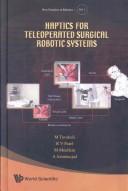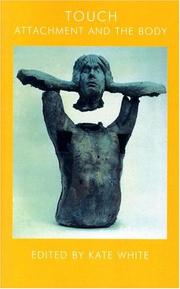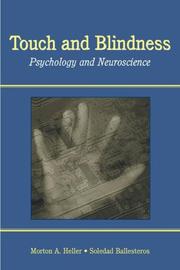| Listing 1 - 10 of 82 | << page >> |
Sort by
|

ISBN: 1281960942 9786611960940 9812813160 9789812813169 9812813152 9789812813152 Year: 2008 Volume: v. 1 Publisher: Hackensack, NJ : World Scientific,
Abstract | Keywords | Export | Availability | Bookmark
 Loading...
Loading...Choose an application
- Reference Manager
- EndNote
- RefWorks (Direct export to RefWorks)
An important obstacle in Minimally Invasive Surgery (MIS) is the significant degradation of haptic feedback (sensation of touch) to the surgeon about surgical instrument's interaction with tissue. This monograph is concerned with devices and methods required for incorporating haptic feedback in master-slave robotic MIS systems. In terms of devices, novel mechanisms are designed including a surgical end-effector (slave) with full force sensing capabilities and a surgeon-robot interface (master) with full force feedback capabilities. Using the master-slave system, various haptic teleoperation c
Robotics in medicine. --- Touch. --- Feeling --- Haptic sense --- Haptics --- Tactile perception --- Tactual perception --- Somesthesia --- Medicine

ISBN: 0429484089 1283249111 9786613249111 1849404569 9781849404563 1855753618 9781855753617 9781780496344 1780496346 0429908857 0429923082 Year: 2004 Publisher: London Karnac Books for the Centre for Attachment-based Psychoanalytic Psychotherapy
Abstract | Keywords | Export | Availability | Bookmark
 Loading...
Loading...Choose an application
- Reference Manager
- EndNote
- RefWorks (Direct export to RefWorks)
Drawn from the Bowlby Memorial Lecture, founded in commemoration of the influential Dr John Bowlby, this volume explores issues of the body and the historically taboo subject of touch in psychoanalysis. It includes contributions from a wide range of professional backgrounds, including two papers presented by pioneering analyst Susie Orbach.Contributors: Anne Aiyegbusi; Brett Kahr; Bernice Laschinger; Susie Orbach; Margot Sutherland; Colwyn Trevarthen; and Kate White.
Touch --- Human body --- Psychotherapy --- Feeling --- Haptic sense --- Haptics --- Tactile perception --- Tactual perception --- Somesthesia --- Therapeutic use --- Psychological aspects

ISBN: 113561931X 1282375431 9786612375439 1410615677 9781410615671 9780805847253 0805847251 9780805847260 080584726X 9781135619312 9781135619268 1135619263 9781135619305 1135619301 0805847251 080584726X 9781282375437 6612375434 Year: 2006 Publisher: Mahwah, N.J. : Lawrence Erlbaum Associates,
Abstract | Keywords | Export | Availability | Bookmark
 Loading...
Loading...Choose an application
- Reference Manager
- EndNote
- RefWorks (Direct export to RefWorks)
Research on touch and blindness has undergone rapid transformation in recent years, with dramatic developments in technology designed to provide assistance to those who are blind, and advancements in robotics that demand haptic interfaces. Touch and Blindness approaches the study of the topic from the perspectives of psychological methodology and the most sophisticated, state-of-the-art techniques in neuroscience. This book, edited by well-known leaders in the field, is derived from the discussions presented by speakers at a conference held in 2002, and presents current research in the
Touch --- Blindness --- Touch. --- Blindness. --- Amaurosis --- Vision disorders --- Feeling --- Haptic sense --- Haptics --- Tactile perception --- Tactual perception --- Somesthesia --- Psychological aspects.
Book
ISBN: 1424407605 1424407613 1509091750 Year: 2006 Publisher: [Place of publication not identified] IEEE
Abstract | Keywords | Export | Availability | Bookmark
 Loading...
Loading...Choose an application
- Reference Manager
- EndNote
- RefWorks (Direct export to RefWorks)
Human-computer interaction --- Virtual reality --- Robotics --- Touch --- Sound --- Engineering & Applied Sciences --- Computer Science --- Feeling --- Haptic sense --- Haptics --- Tactile perception --- Tactual perception --- Sound in virtual reality --- Somesthesia
Book
ISBN: 1479900885 1479900877 Year: 2013 Publisher: [Place of publication not identified] IEEE
Abstract | Keywords | Export | Availability | Bookmark
 Loading...
Loading...Choose an application
- Reference Manager
- EndNote
- RefWorks (Direct export to RefWorks)
Human-computer interaction --- Virtual reality --- Robotics --- Touch --- Engineering & Applied Sciences --- Computer Science --- Feeling --- Haptic sense --- Haptics --- Tactile perception --- Tactual perception --- Somesthesia
Book
ISBN: 0769523102 1538600560 Year: 2005 Publisher: [Place of publication not identified] IEEE Computer Society
Abstract | Keywords | Export | Availability | Bookmark
 Loading...
Loading...Choose an application
- Reference Manager
- EndNote
- RefWorks (Direct export to RefWorks)
Human-computer interaction --- Virtual reality --- Robotics --- Touch --- Engineering & Applied Sciences --- Computer Science --- Feeling --- Haptic sense --- Haptics --- Tactile perception --- Tactual perception --- Somesthesia
Book
ISBN: 0780393767 1509097279 Year: 2005 Publisher: [Place of publication not identified] IEEE
Abstract | Keywords | Export | Availability | Bookmark
 Loading...
Loading...Choose an application
- Reference Manager
- EndNote
- RefWorks (Direct export to RefWorks)
Human-computer interaction --- Virtual reality --- Robotics --- Touch --- Sound in virtual reality --- Engineering & Applied Sciences --- Computer Science --- Feeling --- Haptic sense --- Haptics --- Tactile perception --- Tactual perception --- Somesthesia
Periodical
ISSN: 26734192
Abstract | Keywords | Export | Availability | Bookmark
 Loading...
Loading...Choose an application
- Reference Manager
- EndNote
- RefWorks (Direct export to RefWorks)
virtual reality --- augmented reality --- extended reality --- haptics --- immersive media --- Virtual reality --- Virtual reality. --- Environments, Virtual --- Virtual environments --- Virtual worlds --- Computer simulation --- Reality
Book
ISBN: 0813556112 0813532620 9780813532622 9780813556116 Year: 2002 Publisher: New Brunswick, N.J. Rutgers University Press
Abstract | Keywords | Export | Availability | Bookmark
 Loading...
Loading...Choose an application
- Reference Manager
- EndNote
- RefWorks (Direct export to RefWorks)
Ethics --- Touch --- Philosophy --- Philosophy & Religion --- Feeling --- Haptic sense --- Haptics --- Tactile perception --- Tactual perception --- Somesthesia --- Deontology --- Ethics, Primitive --- Ethology --- Moral philosophy --- Morality --- Morals --- Philosophy, Moral --- Science, Moral --- Values
Book
ISBN: 1423791770 9781423791775 9401200912 Year: 2004 Publisher: Amsterdam New York Rodopi
Abstract | Keywords | Export | Availability | Bookmark
 Loading...
Loading...Choose an application
- Reference Manager
- EndNote
- RefWorks (Direct export to RefWorks)
"Das Leben zu erkennen" (II,5,112) bestimmt Fichte als Gegenstand der "Wissenschaftslehre" (1794 ff.). Die Aufgabe der Philosophie besteht für ihn nicht darin, "durch die Kraft (der) Syllogismen neue Objekte des natürlichen Denkens" (II,5,112) zu erschaffen. Er gewichtet seine Philosophie dergestalt, daß sie "das Leben, das System der Gefühle und das Begehren zum Höchsten (macht) und. der Erkenntnis überall nur das Zusehen (läßt)" (II,5,137). Die herausragende Stellung des Gefühls besteht darin, daß es einerseits als begrifflich explizierbarer Teilaspekt der Reflexionen über die Grundbedingungen der unterschiedlichen Bewußtseins- bwz. Lebensformen des Menschen selbst Bestandteil der "Wissenschaftslehre" ist und daß es andererseits zugleich als die ausgezeichnete Weise der Selbstmanifestation dieser Lebensformen zu bestimmen ist, deren Genese in der "Wissenschaftslehre" rekonstruiert wird. Fichte entwickelt im System der "Wissenschaftslehre" eine weitreichende und complex strukturierte Theorie des Gefühls, die die Bereiche des theoretischen und praktischen, sinnlichen, intellektuellen und intelligiblen Lebens umfaßt. In einem systematisch angelegten Untersuchungsstrang werden Genese, Stellenwert und Funktion des Gefühls in der "Wissenschaftslehre" und ihren Teildisziplinen entwickelt. In historischer Hinsicht wird Fichtes Lehre vom Gefühl im Kontext der zeitgenössischen Diskussion (Kant, Jacobi u.a.) erörtert. Systematische und historische Zielsetzungen werden parallel aus einer entwicklungsgeschichtlichen Perspektive entfaltet. Im Ausgang von den Jugendschriften bis zur "Wissenschaftslehre 1801" wird der Begriff des Gefühls in seinen pädagogischen, erkenntnistheoretischen, moralischen und religiösen Bedeutungen untersucht.
Emotions. --- Feeling. --- Term. --- Feeling --- Haptic sense --- Haptics --- Tactile perception --- Tactual perception --- Somesthesia --- Feelings --- Human emotions --- Passions --- Psychology --- Affect (Psychology) --- Affective neuroscience --- Apathy --- Pathognomy
| Listing 1 - 10 of 82 | << page >> |
Sort by
|

 Search
Search Feedback
Feedback About UniCat
About UniCat  Help
Help News
News